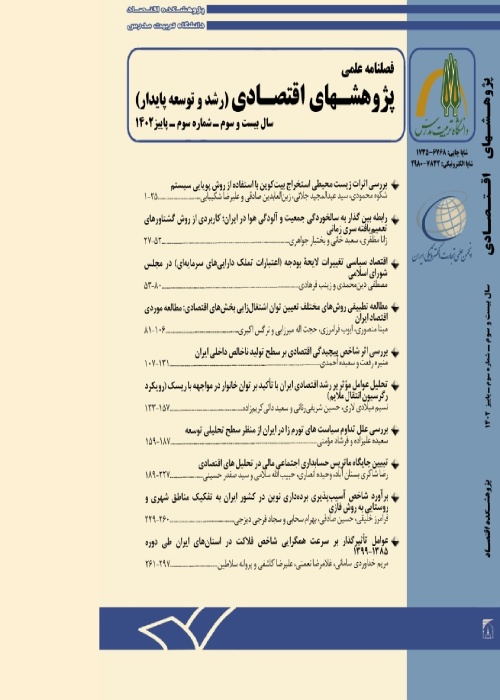Investigation of the Effects of Public Health Expenditure on Macroeconomic Variables under Conditions of Pandemic Disease Outbreak: an Application of the New Keynesian Model
Pandemic diseases are an integral part of the history of human societies and their long-term effects have always been considered. The outbreak of the Covid-19 disease at the end of 2019 caused economists to investigate its economic effects using different models, which were usually based on partial equilibrium. In this study, with the motivation of understanding the effect of the spread of a pandemic disease and its policy responses on economic and health conditions, the dynamic stochastic general equilibrium model and the new Keynesian perspective have been used. Examining the impulse response functions of the variables to the health shock caused by the Covid-19 outbreak indicates a decrease in employment hours, production, consumption, investment, health status and an increase in inflation. In response to these conditions, the increase in public health expenditure leads to a faster convergence of macroeconomic variables to their steady-state values. According to the results of the simulation, it is suggested that the governments use the experiences related to the first wave of the disease outbreak and equip themselves with the necessary tools to use them during the temporary social quarantine (such as the ability to conduct tests on a large part of the population). The ability to identify infected people and impose personal quarantines instead of compulsory quarantines will reduce stagnation. Another solution to control a pandemic is to vaccinate the mass population to achieve herd immunity. All of these require increased public health spending.
The evidence and results of the studies indicate the profound effects of epidemics such as the Covid-19 disease on the economy of countries. In this study, with the motivation of understanding the effect of the spread of epidemic diseases (with an emphasis on the Covid-19) on the economy and the government's policy responses to the dynamics of the macroeconomic variables of Iran, a dynamic stochastic general equilibrium (DSGE) model and the New Keynesian (NK) perspective were used. Unlike computable general equilibrium models, DSGE models are in a random environment, and since the duration of the virus's spread and its impact on the economy are unknown, it is more appropriate to use DSGE models (Yang, Zhang and Chen, 2020). In order to achieve the goals of Jazer's studies, in the first step, a DSGE model based on NK was designed and the effect of an epidemic disease on the macroeconomic variables of Iran was simulated. The designed model was quantified with a three-month (seasonal) frequency and using the data of Iran's economy (2004:2-2021:1).
The results showed that increasing the risk of health disaster by one standard deviation gradually causes a decline in health status. After that, in order to improve the health status, the quarantine hours were increased, which means an increase in investment in health. On the other hand, since more hours are allocated to quarantine, the hours of employment will decrease and subsequently the final productivity of physical capital will decrease, which is due to the complementarity of labor and capital in Cobb-Douglas production function. Finally, labor income and capital income also decrease. Therefore, production, consumption, and investment fluctuate significantly, and this comes from the optimal choice of the household in the face of this impulse. As a result, as the health status declines and consumption declines, the level of well-being declines (like the result of Yang, Zhang, and Chen, 2020). Over time, the lack of physical capital causes an increase in physical investment and working hours, and finally they slowly return to their previous stable level. In the second step, by applying a change in the AR(1) equation of public health expenditure, the effect of the government's financial reaction on the macroeconomic variables of Iran's economy in the face of the health shock was evaluated. In the base scenario, the government has no intervention in the economy and the state of fiscal inactivity is considered for the government. In another scenario, the active presence of the government, or in other words, the design of discretionary financial policy, affects the economy.
The results showed that the design of a discretionary financial policy in the form of increasing public health expenditure in the context of an epidemic has led to a faster convergence of macroeconomic variables to their stable conditions. In justifying the results, it can be stated that in the face of the outbreak of an epidemic, with the increase in public health expenditure and the subsequent increase in quarantine hours, the employment hours have decreased less. On the other hand, the increase in public health expenditure and the subsequent improvement of health leads to an increase in the productivity of the labor force through the increase in the life expectancy of a person as well as the length of working life. This has led to an increase in household income, followed by an increase in the level of consumption and investment. Also, an increase in public health expenditure leads to an improvement in health status. As a general result, the government's financial reactions in the face of the impulse of an epidemic disease lead to a faster convergence of most variables to their stable conditions in the Iranian economy.
- حق عضویت دریافتی صرف حمایت از نشریات عضو و نگهداری، تکمیل و توسعه مگیران میشود.
- پرداخت حق اشتراک و دانلود مقالات اجازه بازنشر آن در سایر رسانههای چاپی و دیجیتال را به کاربر نمیدهد.


